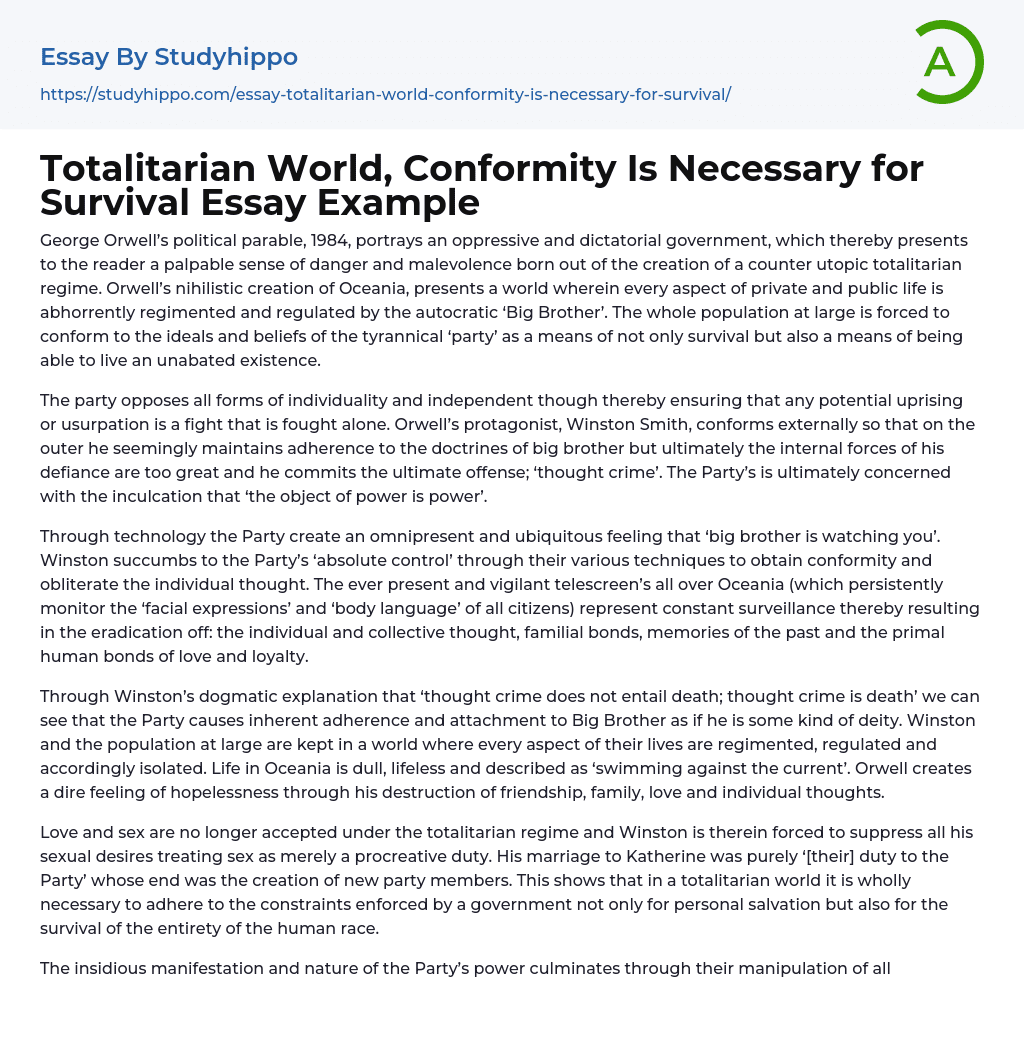

Totalitarian World, Conformity Is Necessary for Survival Essay Example
George Orwell’s political parable, 1984, portrays an oppressive and dictatorial government, which thereby presents to the reader a palpable sense of danger and malevolence born out of the creation of a counter utopic totalitarian regime. Orwell’s nihilistic creation of Oceania, presents a world wherein every aspect of private and public life is abhorrently regimented and regulated by the autocratic ‘Big Brother’. The whole population at large is forced to conform to the ideals and beliefs of the tyrannical ‘party’ as a means of not only survival but also a means of being able to live an unabated existence.
The party opposes all forms of individuality and independent though thereby ensuring that any potential uprising or usurpation is a fight that is fought alone. Orwell’s protagonist, Winston Smith, conforms externally so that on the outer he seemingly maintains adherence to the doctrines of bi
...g brother but ultimately the internal forces of his defiance are too great and he commits the ultimate offense; ‘thought crime’. The Party’s is ultimately concerned with the inculcation that ‘the object of power is power’.
Through technology the Party create an omnipresent and ubiquitous feeling that ‘big brother is watching you’. Winston succumbs to the Party’s ‘absolute control’ through their various techniques to obtain conformity and obliterate the individual thought. The ever present and vigilant telescreen’s all over Oceania (which persistently monitor the ‘facial expressions’ and ‘body language’ of all citizens) represent constant surveillance thereby resulting in the eradication off: the individual and collective thought, familial bonds, memories of the past and the primal human bonds of love and loyalty.
Through Winston’s dogmatic explanation that ‘thought crim
does not entail death; thought crime is death’ we can see that the Party causes inherent adherence and attachment to Big Brother as if he is some kind of deity. Winston and the population at large are kept in a world where every aspect of their lives are regimented, regulated and accordingly isolated. Life in Oceania is dull, lifeless and described as ‘swimming against the current’. Orwell creates a dire feeling of hopelessness through his destruction of friendship, family, love and individual thoughts.
Love and sex are no longer accepted under the totalitarian regime and Winston is therein forced to suppress all his sexual desires treating sex as merely a procreative duty. His marriage to Katherine was purely ‘[their] duty to the Party’ whose end was the creation of new party members. This shows that in a totalitarian world it is wholly necessary to adhere to the constraints enforced by a government not only for personal salvation but also for the survival of the entirety of the human race.
The insidious manifestation and nature of the Party’s power culminates through their manipulation of all aspects of life. History becomes a palimpsest wherein anything can be altered so as to favor the doctrines of the party. Language is slowly becoming eradicated and “ It was intended that when Newspeak had been adopted once and for all and Oldspeak forgotten, a heretical thought should be literally unthinkable, at least so far as thought is dependent on words”.
This illustrates that the party wishes to create orthodoxy wherein independent and singular thought which repudiate any vestiges of humanity and digress from the principles of the
party are blatantly impossible. Winston is of the belief that if he is able to maintain the facade of external adherence to the ideologies enforced by Big Brother, he will be somehow able to escape and live out an unscathed existence.
However, the fact that O’Brien’s declaration that the Party had been watching him for 7 years and long before he even puts pen to paper proves that to survive conformity not only externally but internally is the key to living an unabated existence. In the end the Party’s satanic and ultimately dehumanizing regime extinguishes all beacons of hope for any of the population. The character O’Brien espouses this via his heinous treatment of Orwell’s protagonist. From early on in the novel, O’Brien’s nihilistic nature is seen and his character is one that is completely devoid of all hope.
This is illustrated by the initial meeting between Julia, Winston and O’Brien (before the reader knows O’Brien is but a tool of the Party) wherein he plainly states ‘you will get caught, you will confess, we are the dead’. Once O’Brien is revealed to be nothing but a vessel to do the bidding of Big Brother, Winston still idolizes him and views him in some type of romanticized light, he is able to inflict pain and torment yet he is also a potential savior and paradoxically, O’Brien is viewed in a light similar to that of a priest.
- Puritans essays
- Afterlife essays
- Buddhism essays
- Christianity essays
- Deism essays
- Faith essays
- God essays
- Hinduism essays
- Islam essays
- Jews essays
- Judaism essays
- Monotheism essays
- New Testament essays
- Ritual essays
- Sin essays
- Soul essays
- Theology essays
- Confession essays
- Devil essays
- Miracle essays
- Monk essays
- Revelation essays
- Atheism essays
- Immortality essays
- Jainism essays
- Sinners essays
- Bible essays
- Old Testament essays
- Salvation essays
- Temple essays
- Taoism essays
- Pilgrimage essays
- Freedom Of Religion essays
- Existence of God essays
- Christian Worldview essays
- Cosmological Argument essays
- Gautama Buddha essays
- Karma essays
- Buddha essays
- Baptism essays
- Holy Spirit essays
- Jesus Christ essays
- Adam And Eve essays
- Crucifixion Of Jesus essays
- Crusades essays
- Eucharist essays
- God The Father essays
- Pope essays
- Protestantism essays
- Christian essays



